
-
 Discord seen as online home for renegades
Discord seen as online home for renegades
-
US forecasts severe solar storm starting Thursday

-
 Ratan Tata: Indian mogul who built a global powerhouse
Ratan Tata: Indian mogul who built a global powerhouse
-
One dead as storm Kirk tears through Spain, Portugal, France

-
 Indian business titan Ratan Tata dead at 86
Indian business titan Ratan Tata dead at 86
-
Fed minutes highlight divisions over rate cut decision

-
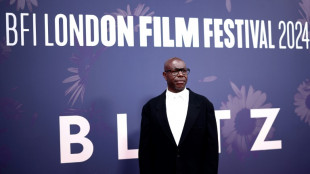 Steve McQueen debuts new WWII film at London festival
Steve McQueen debuts new WWII film at London festival
-
Nobel winners hope protein work will spur 'incredible' breakthroughs

-
 What are proteins again? Nobel-winning chemistry explained
What are proteins again? Nobel-winning chemistry explained
-
AI steps into science limelight with Nobel wins

-
 Overshooting 1.5C risks 'irreversible' climate impact: study
Overshooting 1.5C risks 'irreversible' climate impact: study
-
Demis Hassabis, from chess prodigy to Nobel-winning AI pioneer

-
 Global stocks diverge as Chinese shares tumble
Global stocks diverge as Chinese shares tumble
-
Time runs out in Florida to flee Hurricane Milton

-
 Chad issues warning ahead of more devastating floods
Chad issues warning ahead of more devastating floods
-
Creator's death no bar to new 'Dragon Ball' products

-
 Chinese stocks tumble on lack of fresh stimulus
Chinese stocks tumble on lack of fresh stimulus
-
Trio wins chemistry Nobel for protein design, prediction

-
 Braving war: Lebanon's 'badass' airline defies odds
Braving war: Lebanon's 'badass' airline defies odds
-
US weighs Google breakup in landmark trial

-
 Chinese stocks tumble on stimulus upset, Asia tracks Wall St higher
Chinese stocks tumble on stimulus upset, Asia tracks Wall St higher
-
7-Eleven owner confirms new takeover offer from Couche-Tard

-
 A US climate scientist sees hurricane Helene's devastation firsthand
A US climate scientist sees hurricane Helene's devastation firsthand
-
Can carbon credits help close coal plants?

-
 Boeing suspends negotiations with striking workers
Boeing suspends negotiations with striking workers
-
7-Eleven owner's shares spike on report of new buyout offer

-
 Your 'local everything': what 7-Eleven buyout battle means for Japan
Your 'local everything': what 7-Eleven buyout battle means for Japan
-
AI-aided research, new materials eyed for Nobel Chemistry Prize

-
 The US economy is solid: Why are voters gloomy?
The US economy is solid: Why are voters gloomy?
-
Scientists sound AI alarm after winning physics Nobel
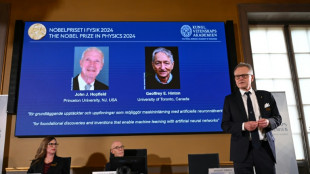
-
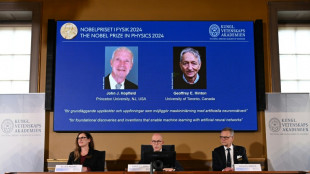 Nobel-winning physicist 'unnerved' by AI technology he helped create
Nobel-winning physicist 'unnerved' by AI technology he helped create
-
Trump secretly sent Covid tests to Putin: Bob Woodward book

-
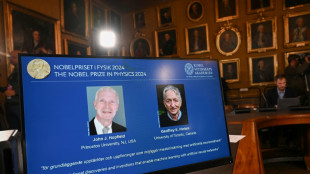 Neural networks, machine learning? Nobel-winning AI science explained
Neural networks, machine learning? Nobel-winning AI science explained
-
Boeing delivers 27 MAX jets in September despite strike

-
 Stock markets diverge as Hong Kong sinks, oil prices fall
Stock markets diverge as Hong Kong sinks, oil prices fall
-
US trade gap narrowest in five months as imports slip

-
 Stay and 'you are going to die': Florida braces for next hurricane
Stay and 'you are going to die': Florida braces for next hurricane
-
Geoffrey Hinton, soft-spoken godfather of AI

-
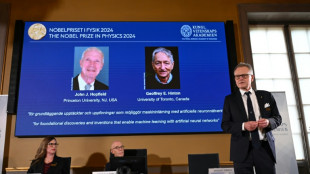 Duo wins Physics Nobel for 'foundational' AI breakthroughs
Duo wins Physics Nobel for 'foundational' AI breakthroughs
-
German 'Maddie' suspect could be free in 2025 after cleared of separate sex crimes

-
 China slaps provisional tariffs on EU brandy imports
China slaps provisional tariffs on EU brandy imports
-
Duo wins Physics Nobel for key breakthroughs in AI
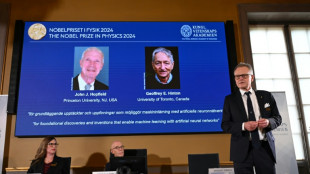
-
 German 'Maddie' suspect could be free soon after cleared of separate sex crimes
German 'Maddie' suspect could be free soon after cleared of separate sex crimes
-
China says to take anti-dumping measures against EU brandy imports

-
 China stocks rally fizzles on stimulus worries amid Asia retreat
China stocks rally fizzles on stimulus worries amid Asia retreat
-
China stocks rally peters out on stimulus worries amid Asia retreat

-
 Taiwan's Foxconn says building world's largest 'superchip' plant
Taiwan's Foxconn says building world's largest 'superchip' plant
-
Nobel literature jury may go for non-Western writer
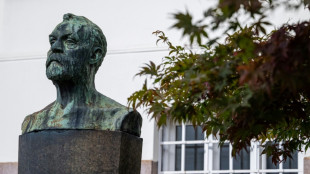
-
 From Bolivia to Indonesia, deforestation continues apace
From Bolivia to Indonesia, deforestation continues apace
-
China holds off on fresh stimulus but 'confident' will hit growth target


Pat Cullen: 'tenacious' leader of UK's striking nursing union
In the space of just a few months, Pat Cullen has become the public face of Britain's nurses, whose historic strike has laid bare a health service on its knees.
Cullen, 58, comes from a family of nurses: four of her five sisters are all in the profession and she admits that nursing is "in my blood".
The softly spoken Northern Irishwoman is not willing to budge on her union's demands and warns the government that she is "tenacious".
"When I believe in something I'll follow it through to the bitter end," she told The Guardian newspaper.
Wes Streeting, an opposition Labour lawmaker in charge of health policy, called her a "tough negotiator".
A nurse for 41 years, Cullen became the general secretary of the Royal College of Nursing (RCN) union and professional body in 2021.
She represents its membership of nearly 450,000 nurses, midwives and healthcare assistants -- the largest such union in the world.
Under her leadership, the members voted for a historic strike: for the first time since the RCN was founded 106 years ago, they stopped work on December 15 and 20.
As the Conservative government stuck to its view that the pay rises they are asking for are unaffordable, the nurses went back on strike on Wednesday and Thursday this week.
Further industrial action is planned on February 6 and 7.
Cullen says they have no choice: due to the austerity policies of Conservative governments, nurses' pay has fallen nearly 20 percent in real terms in the last 10 years.
The RCN wants a pay increase of around 19 percent, well above inflation which stands at 10.5 percent, to offset the decrease.
- Support -
Cullen's mood was far from celebratory on the first day of December's strike.
"This is a tragic day for nursing, it's a tragic day for patients," she said at a picket outside a hospital.
Ambulance drivers, railway workers and teachers have also gone on strike over pay disputes, causing the kind of mass disruption not seen in Britain for decades.
But what's different about the nurses' strike is the degree of public support for their cause.
Almost two-thirds of British people support it, according to a poll published January 17.
The public retains a strong sense of loyalty to the state-funded National Health Service (NHS) and feels grateful to nurses for their care during the pandemic.
Cullen is playing an active role getting the nurses' position across.
She regularly tours television studios to describe exhausting daily rounds, tens of thousands of unfilled posts and how some nurses have had to resort to using food banks.
"This is our time to speak up and have our voice heard on behalf of our patients," she stressed.
- Family history -
For Cullen, nursing is more than a calling: it's also a family affair. Born to a farming family, she is the youngest of seven siblings, six of whom are girls.
Her eldest sister, who is 17 years older, was the first to qualify.
"I remember her coming home in her beautiful nurse's uniform talking passionately to us as a young family about what she'd been doing on her last shift", Cullen told The Guardian.
To her great regret, her two children have chosen other paths, but her husband works as a GP in Northern Ireland.
Cullen started work as a mental health nurse.
She embarked on her first fight with the management at a psychiatric hospital in Antrim in Northern Ireland in 1983.
She wrote to the management to complain about its "heartless policy" of taking personal items away from patients to punish them for difficult behaviour.
"I felt it was totally unfair. These people were ill... Patients on the wards couldn't cope without their own personal belongings," she recalled.
She won the battle.
Cullen had always been a member of the RCN, but in 2019, she became director of the RCN in Northern Ireland.
After seven months, she led a three-day strike by nurses demanding a pay increase. This was the first such action since the union's creation.
She won that battle, too.
As Rishi Sunak's government will be well aware, Cullen isn't one to give up without a fight.
D.Goldberg--CPN
